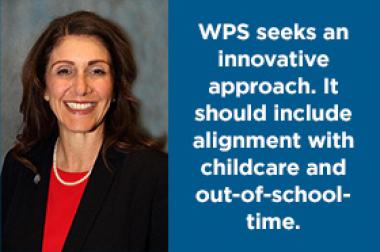
Worcester Public Schools Superintendent Dr. Rachel Monárrez has the right idea. In a January 8th Telegram column, she implored our community to “lean in, act courageously, and ignore the noise.”
WPS, she said, “is poised to be a district that is a leader in the Commonwealth,” as it develops the future leaders of our community.
As every parent and early educator knows, success begins in early childhood. So, too, does a genuinely innovative education system. Symbiotic relationships across age levels, and in- and out-of-school time, will benefit all children as they navigate from childcare settings to kindergarten, elementary school, and beyond.
So, let’s act courageously. Let’s do what the research proves is effective: support young people from day one to graduation day.
Raise the youngest parent voices before kindergarten

Age-appropriate development and seamless progression through ages and stages depends on parent engagement. WPS does an outstanding job of raising awareness for parents of middle and high school students. There is room for improvement during the kindergarten and elementary school years.
There is an even greater need to engage with the youngest parents. The earlier we reach parents of children 0-5 years old, the better prepared those children will be for the rapidly evolving academic and social-emotional challenges they will face as they grow.
Create more “play in k” for kindergarten students

Since play is how children learn, high-quality childcare programs emphasize educational play activities. WPS kindergarten programs would also benefit from an increase of carefully constructed play-based curriculums; research shows that positive playtime helps students achieve age-appropriate development.
Those in early childhood spaces see first-hand the benefits of positive play time. We’re sure kindergarten and elementary school teachers will too.
Empower out-of-school-time partnerships
Just as learning doesn’t start in kindergarten, it doesn’t end when children leave school for the day or for school-year vacations and summer breaks.
Worcester’s rich variety of out-of-school-time programming, from after school to summer camps, plays a vital role in developing the range of attributes that spell academic and career success.
By building bridges from WPS to out-of-school-time programs, our community can broaden learning and growth to the benefit of all young people and support the vital work of WPS teachers and staff.
Quality facilities for all ages and grade levels
As Dr. Monárrez noted in her column, “The age of the school facilities and our historically limited investment in maintenance pose a challenge.”
We couldn’t agree more. Of WPS’s 33 elementary schools, the majority are in need of repairs and many lack technological resources, such as adequate internet access. Half of the city’s elementary schools are without a library.
As a community, we can do better. Effective learning and care only happens when children are safe and comfortable and have the resources they need.
The city of Worcester, Worcester Public Schools, and our early childhood community have seen great change and progress in the last several years. Pandemic challenges, by necessity, created better alignment among providers and schools. Now, with a Superintendent intent on restoring Worcester’s place as an educational leader, we have an opportunity to innovate in new and exciting ways.
Yes, Dr. Monárrez, let’s act courageously. Let’s align programs and systems across ages and stages, and work together for children and the future of our community.
